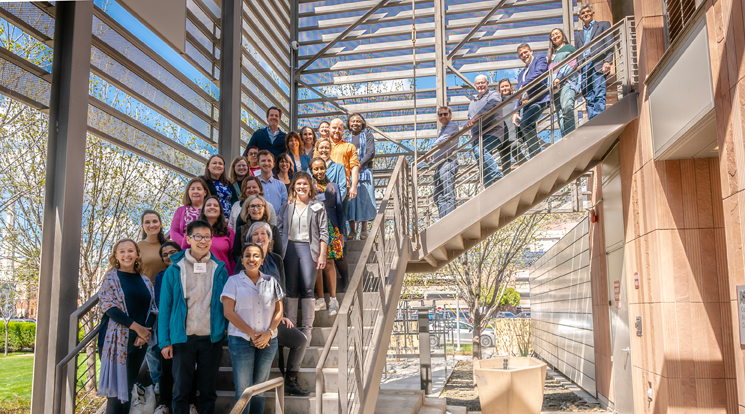Advancing planetary sustainability through education research networks

Representatives of 10 sustainability-oriented research networks joined faculty of Arizona State University’s Mary Lou Fulton Teachers College this month to formally launch an international effort aimed at developing strategic linkages to rearticulate the role of education in sustainable futures.
The in-person meeting was the inaugural gathering of AccelNet-Design: Global Futures Oriented Research Collective on Education for Sustainability, known as G-FORCES, a project funded by the National Science Foundation to bring together international sustainability oriented research networks from the natural sciences, social sciences and humanities to transform education and galvanize a cultural shift toward more sustainable global futures.
"This project reflects ASU’s interdisciplinary efforts to address planetary sustainability challenges,” said Iveta Silova, MLFTC professor and associate dean of global engagement. “By integrating diverse fields of study and fostering international collaboration, we are able to leverage the strengths and insights of network partners in ways that effectively integrate different knowledge ecosystems, bridge the research-practice divide, and prioritize education for planetary wellbeing and ecological justice.”
G-FORCES aims to rearticulate the role of education in advancing planetary sustainability in both formal and non-formal lifelong learning settings. The project is led by Silova with the collaboration Gustavo Fischman, professor, and Andrea Weinberg, associate professor, and it aligns with ASU’s support of sustainability research and education. MLFTC is contributing through the expansion of educational offerings, such as an environmental education certificate program; a Learning Futures Collaborative Education for Planetary Futures, and a Regional Center of Expertise on Education for Sustainable Development, among other initiatives.
Education for planetary futures
The three-day conference started with a public event — Learning, Unlearning, and Relearning: Education for Planetary Futures (watch the recorded video) — that challenged underlying assumptions about education, knowledge production and social change. The discussion shifted attention from lessons learned, a topic that has occupied the attention of education policymakers and practitioners for decades, to what should be unlearned. It was co-sponsored by the Education for Planetary Futures collaborative.
“ASU is committed to a future in which we not only survive but we thrive, and in order to do so we need the outcomes and lessons of the G-FORCES project,” said Sally Morton, executive vice president and professor with ASU Knowledge Enterprise.
“We can no longer be siloed in single disciplines, producing papers that are not disseminated widely and whose results and implications are not translated into action in partnership with industry, academia, government and community partners.”
During the conference, representatives from participating networks and organizations strengthened their relational ties, developed a shared vision, and brainstormed ideas for co-designing operational mechanisms for collaboration. The project’s five primary goals are:
- Identify and assess capabilities, capacities, and resources across networks.
- Convene diverse representatives of transdisciplinary research networks to identify gaps, synergies, and opportunities for inclusive, innovative and collaborative knowledge production and exchange.
- Co-design and activate new operational links across established research communities for sharing capabilities, capacities and resources, with explicit attention to broadening participation, perspectives and approaches.
- Create new connections and opportunities for leadership among diverse international scholars, policymakers and practitioners in accelerating education transformation for planetary sustainability within policy, pedagogy and curricula.
- Generate ideas and opportunities for supporting early career and underrepresented researchers through effective integration into crucial research networks across national and international contexts, particularly those from the Global South.
“First and foremost this is about building relationships, and meeting with purpose as we consider what education sustainability could look like through this interdisciplinary effort, and how evidence-based research can be best utilized to support teacher preparation and effective pedagogy,” said Charlotte Holland, professor at Dublin City University. Holland represented the Regional Center of Expertise in Education for Sustainable Development for the greater Dublin region. DCU is also a member of ASU’s Transatlantic Higher Education Partnership.
Radhika Iyengar, Education Director at the Earth Institute at Columbia University, represented multiple networks including the Sustainable Development Solutions Network and Mission 4.7. She said that networks are an important part of driving systemic change in sustainability.
“What makes this particular network distinct is that it allows for a convergence of networks that can expand and amplify efforts that are taking place around the world,” she said. “G-FORCES builds on our collective knowledge and allows us to have a more cohesive voice in articulating interdisciplinary areas of sustainability that relate to education.”
Power through partnerships
“We are grateful for the many contributions of the G-FORCES network partners and their dedication to building and strengthening inclusive and equitable collaborations,” said Weinberg.
Rajul “Raj” Pandya, executive director of MLFTC’s Global Futures Education Lab and Fulton presidential professor of practice, joined Silova and Weinberg to guide some of the group discussions. Community participation and partnerships are key, he said, to building robust educational systems, creating resources, offering opportunities and nurturing sustainability leaders.
Fischman concurred, adding that “our vision for a sustainable future is based on the belief that education is the foundation upon which we can build a more informed, engaged and resilient global community.”
Participants of G-FORCES include the following organizations:
- The Brazilian National Association of Graduate Studies and Research in Education
- The Climate Literacy and Energy Awareness Network
- Climate-U: Transforming Universities for a Changing Climate
- Learning Planet Alliance
- The Mathematics of Planet Earth
- Regional Centres of Expertise on Education for Sustainable Development - Dublin and the RCE - Greater Phoenix
- Sustainable Development Solutions Network
- Monitoring and Evaluating Climate Communication and Education
- Underwriters Laboratory Research Institutes
- UNESCO Bridges Sustainability Science Coalition